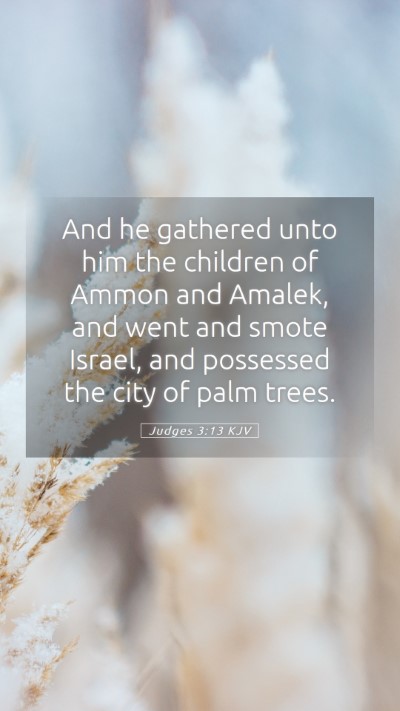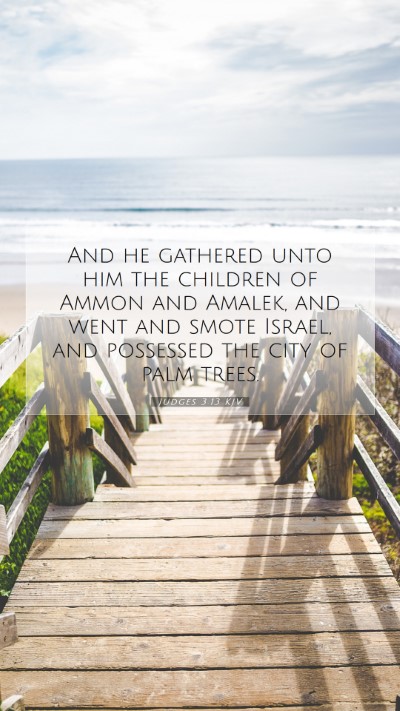Understanding Judges 3:13: A Comprehensive Bible Verse Commentary
Judges 3:13 states: "And he gathered unto him the children of Ammon and Amalek, and went and smote Israel, and possessed the city of palm trees."
The verse describes a critical moment in the history of Israel during the time of the Judges, highlighting the cyclical pattern of sin, oppression, and deliverance that characterizes the book.
Verse Meaning and Context
This verse illustrates the adversities faced by the Israelites in their journey. The enemy forces led by Eglon, king of Moab, allied with the Ammonites and Amalekites, signify the relentless pressure on Israel's freedom.
-
Historical Background:
The Israelites had settled in the Promised Land after the conquest under Joshua. However, their failure to completely displace the inhabitants led to continuous conflicts and oppression.
-
Spiritual Implications:
This passage demonstrates the consequences of turning away from God, leading to subjugation and suffering, which is a recurring theme within the book of Judges.
Biblical Exegesis and Commentary Insights
In understanding this passage, one can draw from various public domain commentaries:
Matthew Henry's Commentary
Henry emphasizes the importance of the Israelites’ repeated failings. He points out that their spiritual decline leads to God's judgment through foreign oppressors. The mention of the “city of palm trees,” likely Jericho, denotes the tangible loss of their inheritance due to disobedience.
Albert Barnes’ Notes
Barnes expounds on the coalition formed by Eglon with the Ammonites and Amalekites, underlining how this partnership represents a formidable threat to Israel. He notes that the city of palm trees signifies a place once blessed but now under siege due to Israel's moral compromises.
Adam Clarke's Commentary
Clarke provides insight into the significance of the geographical setting, elaborating on the richness of Jericho, once a flourishing city, now impacted by the Israelites' disobedience. He underscores the profound impact of national sin attracting national calamities.
Key Themes and Applications
This verse, while describing a historical event, resonates with several modern applications:
- The consequences of sin: The narrative serves as a reminder of how disobedience to God can lead to dire circumstances.
- God’s sovereignty: The cycle of oppression and deliverance underscores God's ultimate control over nations and His people.
- Courage in adversity: Despite the challenges, Israel learned through these experiences to call on God for deliverance, foreshadowing the eventual rise of leaders like Ehud.
Cross References
This verse can be connected with the following Scriptures:
- Judges 3:12 - Further context on Israel's sin and oppression.
- Deuteronomy 20:17 - God's command regarding the nations in Canaan.
- 1 Samuel 12:9-10 - Reflection on Israel's cycle of sin and deliverance.
Conclusion
Judges 3:13 encapsulates a significant moment of struggle and consequence for Israel. By understanding the commentary perspectives, we are reminded of the importance of fidelity to God's laws and the overarching theme of redemption.
For further insights, consider joining Bible study groups or participating in online Bible study resources that delve deeper into such Scripture analysis for a profound understanding of Bible verses.


